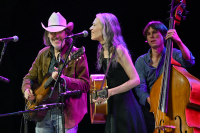Television often throws up unpleasant images to surprise you, like finding an earwig in the sugar. The BBC has got the transmission rights for Formula One motor racing, and they were lucky in that the Australian Grand Prix (BBC1, Sunday), which opened the new season, proved a very exciting race, and was won by a Brit. There were lots of crashes, nobody was hurt, and that’s the way we like it.
The commentary seemed much the same as ever, but they have created some high-tech titles for the start which are meant to thrill you with the sheer genius of the engineers who make the cars and the carbon-based life forms that drive them, but really only looked like modern razor ads, which are also very noisy and also try to persuade you that you’re scraping away your bristles with something marginally less advanced than the Voyager spacecraft.
But the thing that really got to me, the adder on the putting green, was the sight of Richard Branson, who had flown out to support the team he sponsors, Brawn. Now the last time I went on one of Branson’s trains there was literally no room even to stand in standard class. The fare was probably near what Jenson Button gets for one race, yet we were reliant on the ticket inspector allowing us to sit in first as an act of kindness, without charging us double for the ticket. Why can’t he get that right, instead of swanning round the world? Branson really is a New Labour creation: all spin and less substance, terrific brand recognition and inadequate service.
‘My 50 years of travelling around Whicker’s World…’ said Alan Whicker, and to him it really is Whicker’s World, a planet that bears a passing resemblance to, yet is strangely different from, the one the rest of us inhabit. He was introducing part two of Alan Whicker’s Journey of a Lifetime (BBC2, Wednesday). It was intensely nostalgic. Remember Monty Python’s Whicker’s Island, in which they all wore heavy-rimmed glasses. And talked. Like this? (Or as the real Whicker described California: ‘This lavish, loony place. On America’s far-out fringe.’) Pan Am planes crossed the skies, from the days when it was thrilling to be on a jet plane, and Pan Am was the glamorous airline. Whicker always looked like the kind of chap who would take a young gel in his Bentley to a country hotel, only emerging from the room to place a few bets. Now he resembles the oldest member of the golf club, though his ties might be banned in some. One scary stripy job was in cerise, orange, navy, lime green, primrose and royal blue.
And yet, he did do some amazing interviews, bringing us the first gay kiss on British TV, drugs, computer dating, gun crime, female and trans-gender cops. Back in the Seventies these were unimaginable bizarre phenomena, and we didn’t believe any would actually come here. He went to a swingers’ club: ‘The orgies are held in the mat room. After crossing the mattresses, I decided to burn my socks.’ And sometimes he could turn neat phrases that were not pastiches of himself. On LA: ‘The city is like a vast motel, where everyone is about to leave.’
The Great British Menu (BBC2, Monday) is an upmarket version of Masterchef. It shows serious signs of a cuisine afflicted by that programme and by Heston Blumenthal. One main course was braised lobster with chicken gizzards, baby root vegetables, langoustine tagliatelli and white port sauce. No thanks, sausage and mash for me.




Comments